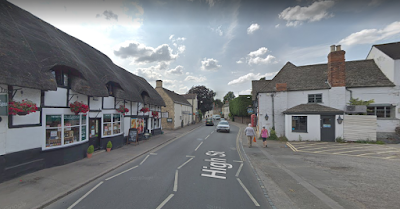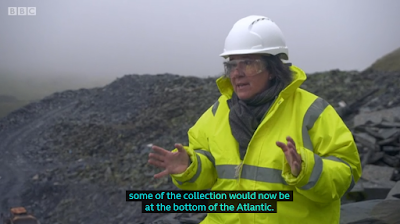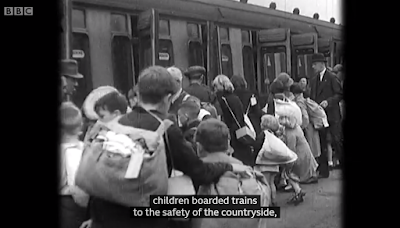Lois and I have our usual shower but this morning we're preparing for a strange day - no doubt about that. We've been invited to a partly-social gathering of (as it turns out) about 12 people in somebody's back garden - yikes, scary!
In our state of confusion, Lois forgets to phone through our weekly grocery order to the Budgens convenience store in the village, and I forget to remind her. Orders are supposed to be in by 1 pm for delivery on Saturday. I suddenly realise the omission at 4 pm in the afternoon, and Lois decides to ring them anyway and hope for the best - we are regular customers so we think they'll be kind - and they are, which is nice!
Budgens convenience store in the village (on left hand side)
11:00 We set off for the village of Eckington in the wilds of Worcestershire, and we go through the side gate to the back garden. The occasion is a full-immersion baptism in a hot tub of a young woman wanting to join Lois's sect.
Unfortunately it's another chilly day, so we're both wearing winter coats and scarves, even - but at least there's no rain in the forecast for today, which is some comfort: oh dear!
It's a big garden so plenty of room to be socially distanced in family groups. This is good because there are about 12 people present, all members of the sect except for me and Richard, the slightly weird and wacky psychologically-challenged husband of sect-member Hilary. It's quite nice that Richard's there because I don't feel too strange being there, plus Richard's totally random comments and pleasant, laid-back, good humour always lighten the mood, which is nice!
Hilary (right) with wacky husband, Richard
The baptism takes place at 12 noon, and it's preceded by coffee and cake, 2 short "addresses", 2 hymns and a couple of bible readings, all punctuated by Wacky Richard's cheery, random and meaningless comments. Richard also talks to the host family's two spaniels, which is nice - it makes them feel included, no doubt about that.
13:30 The ceremony ends - a lot of people have to be somewhere, but Lois and I just have to get home - it's time for a late lunch, followed by a couple of hours in bed for a nap - zzzzzz!!!!!!
Talking over the experience afterwards, Lois and I agree we both felt a bit dazed to suddenly be in the company of a dozen people sharing some eats with them, after months of mostly just knocking about in the house with each other.
It just felt really weird!
20:00 We settle down on the couch and watch a bit of TV, the latest episode of ex-cabinet minister Michael Portillo's series on "Great British Train Journeys".
It's astonishing, but one of the UK Government's top priorities as World War II approached was to protect the nation's most cherished paintings from being bombed to oblivion in the National Gallery in London.
We usually seem to be such a disorganised country most of the time, but this operation goes to show that when Britain really makes up its mind to do something it can do it pretty quickly if it really wants to. After only a few days' of concerted planning, all 2000 of these paintings were transported to North Wales, many of them to be stored in an old mine next to a slate quarry - and they had all arrived by the day that war broke out: September 3rd 1939.
The mine was roofed with a natural coat of ancient granite, which made it the ideal bomb-proof shelter. Just as well that they took this decision, because the National Gallery in Trafalgar Square was bombed several times during the course of the war.
For Lois and me it sends us a chilling picture of what the national mood must have been at that time - expecting the worst, and planning for it.
After the fall of France in 1940, the idea was even mooted of transporting our art works even further away - to Canada, but it was decided in the end that just getting them to Canada would be risky enough, because of all the U-boats in the North Atlantic.
Yikes!!!
On the previous programme in this series, when presenter Michael was in Bangor, we heard about the wartime evacuation of children from our large cities: and 2000 came to the town of Bangor alone from Liverpool and other cities in NW England.
Lois and I didn't realise, but apparently we were pretty much the only country in Europe to do this kind of thing: the only other case was Finland, where a much smaller number - 70.000 children - were evacuated to Sweden.
The evacuation of our children from urban areas was another fantastic feat of organisation. One million and a half children moved that very first weekend of the war: some were accompanied by their mothers, some went on their own, some went with older siblings: you actually had to be only over the age of 7 to be responsible for a sibling under the age of 5: my god!
And they all had to have families to go to. And only one child was lost in the whole operation, and he/she was found later, because they'd simply got on the wrong train - oh dear!
The children wore labels - actually simple Woolworths luggage labels - showing the child's name and school, and a number for the registration district they had come from.
Fascinating stuff !!
22:00 We go to bed - zzzzzzzzz!!!!!!


















No comments:
Post a Comment